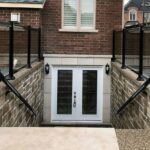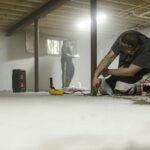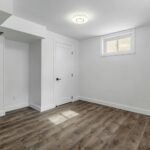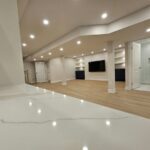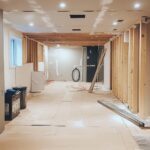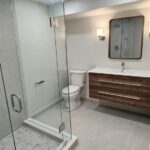Popular Basement Finishing Materials and Their Benefits
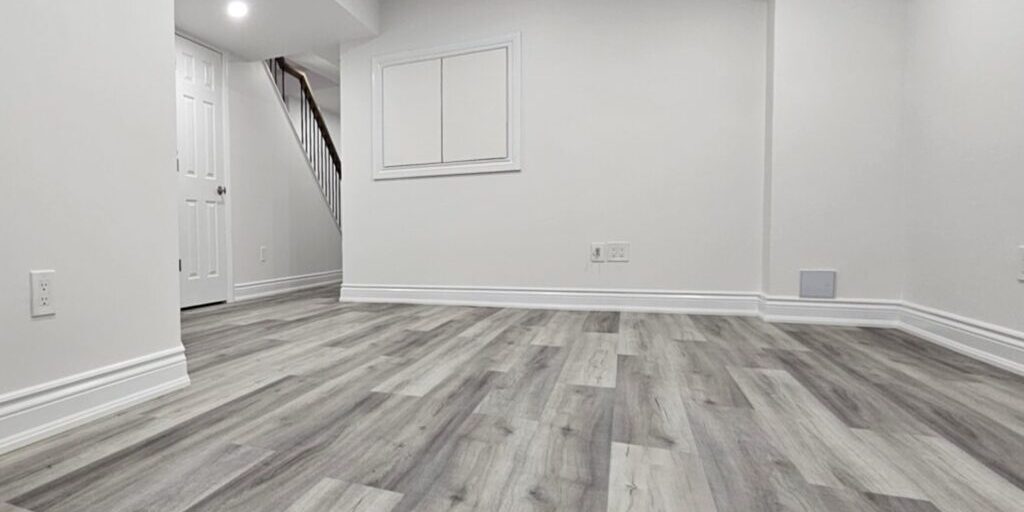
When it comes to basement renovations, selecting the right finishing materials is crucial for ensuring both functionality and longevity. Basements often present unique challenges, such as increased moisture, fluctuating temperatures, and limited natural light. The materials you choose can greatly impact the durability, comfort, and overall aesthetic of your finished basement. Whether you’re aiming to create a cozy family room, a stylish home office, or a functional gym, the right finishes can transform your space into a comfortable and inviting environment.
In this guide, we’ll explore some of the most popular basement finishing materials and highlight their benefits to help you make the best decision for your renovation project.
Moisture-Resistant Drywall
One of the most common challenges in basement renovations is dealing with moisture. That’s why moisture-resistant drywall is an essential material to consider. Unlike standard drywall, which can easily absorb moisture and lead to mold growth, moisture-resistant drywall is specifically designed to withstand damp conditions.
Benefits:
- Prevents Mold and Mildew: This type of drywall is specially coated to resist moisture, making it ideal for basements prone to dampness or humidity.
- Durable and Long-Lasting: Moisture-resistant drywall maintains its integrity even in high-humidity environments, ensuring your walls stay sturdy for years.
- Easy to Install and Finish: Installation is straightforward, and it can be painted or finished like standard drywall, allowing for design flexibility.
Use Case:
For homeowners looking to finish their basement without worrying about future water damage, moisture-resistant drywall offers peace of mind and durability. It’s perfect for areas like family rooms, offices, or any finished space below ground.
Luxury Vinyl Plank Flooring
Luxury Vinyl Plank (LVP) flooring has become a top choice for basement renovations due to its durability, water resistance, and stylish design options. Unlike traditional hardwood, LVP is engineered to handle moisture, making it an ideal flooring solution for basements that may be prone to dampness.
Benefits:
- Water-Resistant: One of the biggest advantages of LVP is its water resistance, ensuring it can withstand any moisture issues in the basement without warping or damage.
- Durable and Low Maintenance: LVP is highly durable, resistant to scratches and stains, making it perfect for high-traffic areas. It’s also easy to clean and maintain.
- Variety of Styles: LVP comes in various designs, including realistic wood and stone finishes, allowing homeowners to achieve the look of premium materials without the high cost or maintenance.
Use Case:
LVP flooring is a fantastic option for creating a stylish yet practical basement living space. Whether you’re transforming your basement into a family room, home office, or play area, LVP offers the durability and design versatility you need to complement any style.
Engineered Wood Flooring
For homeowners who love the natural beauty of hardwood but need a material that can handle the basement’s moisture levels, engineered wood flooring is an excellent solution. Unlike solid hardwood, engineered wood is designed with layers that make it more stable in environments prone to humidity.
Benefits:
- Moisture Resistance: Engineered wood’s layered construction provides greater resistance to moisture, reducing the risk of warping or swelling in damp environments.
- Real Wood Look: Despite its engineered construction, the top layer is real wood, giving your basement the authentic warmth and elegance of hardwood.
- Easy Installation: Engineered wood is often easier and quicker to install than traditional hardwood, which can help save on labor costs.
Use Case:
Engineered wood flooring is perfect for homeowners looking to add a touch of luxury to their basement. It’s ideal for spaces where you want the classic, rich look of hardwood but need the durability and moisture resistance that comes with modern flooring technology.
Ceramic or Porcelain Tile
Ceramic and porcelain tiles are among the most durable and versatile materials for basement flooring. These tiles are well-known for their water resistance, making them an excellent choice for spaces prone to moisture or potential flooding, such as basements.
Benefits:
- Completely Waterproof: Ceramic and porcelain tiles are impervious to water, making them a reliable option for damp environments.
- Highly Durable: These materials are incredibly tough, resistant to wear and tear, scratches, and stains, ensuring a long-lasting flooring solution.
- Aesthetic Versatility: Available in countless designs, colors, and patterns, ceramic and porcelain tiles can easily mimic stone, wood, or even fabric textures, giving homeowners plenty of style options.
- Low Maintenance: Easy to clean and maintain, tiles require little upkeep, making them a hassle-free option for busy households.
Use Case:
Ceramic and porcelain tiles are perfect for areas in the basement like bathrooms, laundry rooms, or even main living spaces where durability and water resistance are key. They are especially suited for homeowners looking for a low-maintenance, stylish, and moisture-proof flooring solution.
Rubber Flooring
Rubber flooring is a versatile and functional option that’s gaining popularity for basement renovations, particularly in spaces like home gyms or playrooms. Known for its durability and shock absorption, rubber flooring provides both comfort and protection for high-impact activities.
Benefits:
- Cushioned Surface: The softness and shock-absorbing nature of rubber flooring make it perfect for spaces where comfort and safety are a priority, such as gyms or kids’ play areas.
- Water-Resistant: Rubber is naturally water-resistant, meaning it can withstand spills or moisture without becoming damaged.
- Durability: Rubber flooring is extremely durable and can handle heavy foot traffic and equipment without showing wear.
- Easy Installation: Available in tiles or rolls, rubber flooring is easy to install and often requires minimal preparation, making it a great choice for DIY enthusiasts.
Use Case:
Rubber flooring is ideal for basements being transformed into home gyms, playrooms, or workshops. Its water-resistant properties and cushioned surface provide comfort and functionality, making it a top choice for families looking to create a safe, durable, and multi-use space.
Carpet Tiles
Carpet tiles offer a flexible and practical option for basement flooring, combining comfort and easy maintenance. Unlike traditional wall-to-wall carpet, carpet tiles can be installed in sections, making them ideal for basements where moisture may be a concern or where certain areas may need frequent replacement.
Benefits:
- Comfort and Warmth: Carpet tiles provide warmth and softness underfoot, which is especially appreciated in basements that tend to have colder floors.
- Easy Replacement: If a section gets damaged or stained, individual tiles can be replaced without having to redo the entire floor, saving time and money.
- Variety of Styles: Available in numerous colors, patterns, and textures, carpet tiles allow for creative design options that can enhance the aesthetic of your basement.
- DIY-Friendly: Carpet tiles are easy to install, making them a great option for DIY projects. They can be laid in various patterns to create a unique, personalized look.
Use Case:
Carpet tiles are a great solution for basements that double as family rooms, playrooms, or home offices. Their comfort, easy maintenance, and replaceable sections make them perfect for spaces where warmth and softness are needed, and where spills or stains are more likely.
Painted Concrete
For homeowners seeking a budget-friendly and minimalist approach, painted concrete offers a practical and modern solution for basement floors. It’s a simple way to make the existing concrete look polished and finished without the expense of additional flooring materials.
Benefits:
- Affordable: One of the most cost-effective options, painting concrete is a great way to give your basement a fresh look without breaking the bank.
- Customizable: Paint allows for endless creativity. You can choose from a wide range of colors, patterns, or even create faux finishes like stone or tile.
- Durable: When properly sealed, painted concrete is highly durable, resistant to moisture, and easy to clean, making it ideal for basements.
- Low Maintenance: Painted concrete requires minimal upkeep. It’s easy to clean and can be refreshed with a new coat of paint when needed.
Use Case:
Painted concrete is perfect for homeowners looking for a sleek, industrial look, or those seeking a budget-friendly way to finish their basement floor. It works particularly well in unfinished basements, utility areas, or even contemporary-style living spaces that embrace minimalist designs.
Wall Panels (Wood, PVC, or Wainscoting)
Wall panels are a popular choice for basement renovations, offering a mix of practicality and visual appeal. Whether you choose wood, PVC, or wainscoting, these panels can add texture, insulation, and protection to your basement walls while enhancing the overall aesthetic of the space.
Benefits:
- Moisture Resistance (PVC Panels): PVC panels are highly resistant to moisture, making them perfect for basements prone to dampness. They prevent mold growth and are easy to clean.
- Adds Insulation: Wood panels and wainscoting can help add a layer of insulation to your basement, improving warmth and energy efficiency.
- Aesthetic Variety: Wall panels come in various materials, colors, and textures, from sleek and modern PVC to classic, elegant wainscoting. This gives homeowners plenty of design flexibility.
- Durability and Protection: Wall panels protect your walls from damage, offering long-lasting durability and easy maintenance, particularly in high-traffic areas.
Use Case:
Wall panels are ideal for homeowners looking to enhance the aesthetic appeal of their basement while adding practical benefits like moisture resistance and insulation. They work well in both living spaces and functional areas, offering a durable and stylish solution for finishing basement walls.
Choosing the Right Materials for Your Basement Renovation
Selecting the perfect finishing materials for your basement renovation is a crucial step in creating a space that’s both functional and visually appealing. Each material comes with its own set of benefits, from moisture resistance to durability and aesthetic flexibility. Whether you’re looking for a cozy family room, a sleek home office, or a functional gym, the right materials can transform your basement into a comfortable and long-lasting living space.
At Yorkland Homes, we specialize in helping homeowners make informed decisions about their basement renovations. With our expertise, we’ll guide you through the process of choosing the best solutions for your unique needs and preferences, ensuring a beautiful, durable result.
Contact Yorkland Homes today to discuss your basement renovation plans and discover how we can help bring your vision to life with the best finishing materials for your space.


